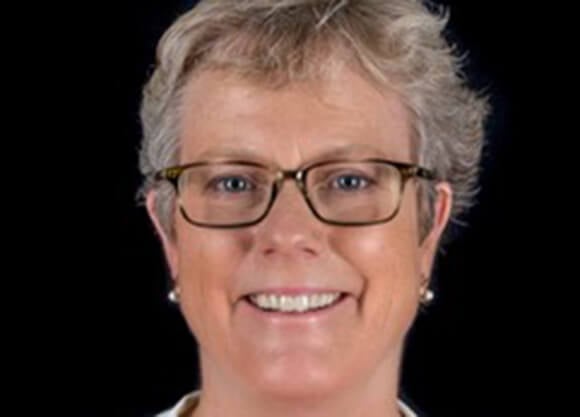
Non-traditional student brings lifetime of experience, enthusiasm to the classroom
May 23, 2022

May 23, 2022

“I was downsized from my corporate career just before the pandemic,” said Zaiken, 66. “I loved teaching and had designs on even doing it full-time, but I had no formal education credentials and the pandemic disrupted my adjunct work — enrollments plummeted and, as an adjunct, I was first to go.”
She researched graduate programs in education and discovered Quinnipiac’s graduate certificate program in instructional design, which she found most appealing. She earned the certificate and enjoyed it so much that she enrolled in an additional course in the master’s program.
Zaiken, who earned a bachelor’s degree in economics and an MBA before building a successful career in marketing with a part-time job as an adjunct professor, said it’s never too late to be a student again.
“Age has plenty of advantages,” she said. “I’m relaxed. I am not juggling a lot of other responsibilities, and I have a lot of experience to draw on.”
Kristen Bourgault, assistant teaching professor of education, said older students like Zaiken naturally have more life experience upon which they can base their understanding of the world — which benefits everyone.
“Often our older students come with diverse experiences as well — they may have served in the military, spent time as dedicated stay-at-home parents, or worked in several different disciplines throughout their career,” Bourgault said. “This diversity of knowledge also strengthens our discussion and collaboration, as each students’ unique perspective provides a different way of looking at course topics.”
Older students, she has found, bring the maturity and increased perspective that comes from life experience and can serve as an anchor in discussions and support to younger students.
“I enjoy what older students bring to the classroom,” Bourgault said. “They often have a clear vision of what they want to get out of a learning experience, as well as an understanding of what it takes to get the most out of what they’re provided. They are not afraid to ask questions or offer feedback, which strengthens my skills as an educator. They also show patience when requesting assistance — they understand the big picture and are less prone to getting mired down by small details or setbacks.”
Zaiken said that although the new technology can be challenging at times, she is enjoying her time back in the classroom — in part thanks to efforts by faculty like Bourgault.
“I work hard to create a warm and supportive environment that invites students to experiment with tools in a non-threatening way,” Bourgault said. “By the end of the first semester, many students are surprised by how much they have learned and how far they have come in terms of tech. Gaining competence with technology can actually be applied to many aspects of a student’s life, not just coursework, and older students are often grateful for this newfound confidence in their ability to adapt to evolving technology.”
Bourgault praised Zaiken for her enthusiastic energy in the classroom.
“Judy has already had a successful career over many years, but she has a clear vision of how she wants to pivot and what she wants her next steps to be — with no intention of ever slowing down,” Bourgault said. “This enthusiasm and focus enables her to dive right into the course material, and extract exactly what she needs to gain the knowledge and skills to move her forward on those next steps.”
Zaiken brings a lifetime of experience to the classroom, Bourgault said.
“I have truly enjoyed having Judy in my courses,” she said. “I always know she is giving her all to the assignments, that she sees the bigger picture of how each piece fits into her own aspirations, and that her friendly voice will infuse our class discussions and my inbox. When I get an email from Judy, I always smile because her comfortable tone reminds me that we can build meaningful relationships through technology, even in the absence of ever meeting face to face.”
Quinnipiac Today is your source for what's happening throughout #BobcatNation. Sign up for our weekly email newsletter to be among the first to know about news, events and members of our Bobcat family who are making a positive difference in our world.
Sign Up Now